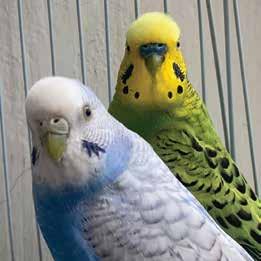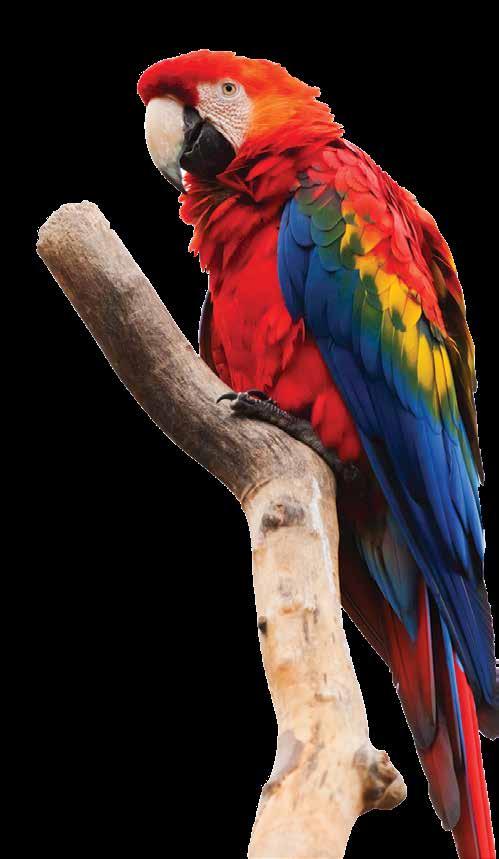
3 minute read
Points on Pets
The Bird is the Word
The perennial question – whether dogs or cats are the more popular pet – continues. In these times, however, more people are looking at other options including fish, smaller animals such as gerbils, guinea pigs and hamsters, and birds. A 2017-2018 survey showed that out of a total of 393.3 million households, fish were the most popular pet (139.3 million), followed by cats (94.2 million), dogs (89.7 million), and birds (20.3 million). With school age children (and many adults!) now spending more and more time at home, and with boredom setting in quickly, smaller pets, usually requiring less maintenance, can help keep them occupied and teach them about science and nature, kindness, love, and compassion.
Things to Consider
• Owning birds can be somewhat high maintenance and thus is
not for everyone. Before considering adding a bird to your household, one of the most important things to know is that they can be noisy. What some see as musical and mellifluous, others may find annoying to say the least.
• If you are a neat-nik and overly concerned with tidiness, know that birds
can be messy. They waste a significant amount of their food and also enjoy throwing it out of their cage. This is not from a desire to be obstreperous but rather due to an innate genetic trait; in the wild, these traits provide food for creatures on the ground below.
Fortunately, this type of mess is fairly easy to clean up and a cage skirt, which wraps around the cage and serves as a trap, can help.
• Birds are essentially wild,
unlike most dogs and cats, and require handling and socialization each day in order to stay tame. They do best with a reliable and structured routine, and some require hours of attention daily. If your schedule does not allow for this, you should reconsider whether a bird is the right pet for you.
• Birds can be destructive.
Their beaks continue to grow throughout their lives and must be worn down frequently to prevent overgrowth. As a result, birds need to chew. The best way to prevent furniture and other items from being destroyed is to provide them with lots of toys. These need to be switched out frequently as they can get damaged quickly and birds become easily bored. Pet stores have numerous options, but it is also fairly easy to make toys for your bird yourself.
• Birds require more than
just a diet of birdseed! To keep your bird in tip-top health, be sure to feed he or she generous portions of raw fruits and vegetables every day, and be sure to wash them carefully. In addition to providing them with key nutrients, the different tastes and textures also stimulate your bird’s mind, creating positive psychological benefits.
Birds also need clean water at all times.
• Birds have delicate respiratory systems, far more sensitive than
humans. Airborne toxins that can be tolerated by humans can be extremely dangerous, and sometimes fatal, to birds. Certain cookware, containing
Teflon, can give off odorless fumes that are rapidly fatal to birds. Cigarette smoke, scented candles, wood smoke, hair spray, perfumes, cleaning products; these are just a few items that give off toxic fumes and are hazardous to birds.
Lifespan of Birds
Some birds can live a very long life. While this is certainly a good thing, it’s important that potential owners are aware that they may have their bird around for many, many years; some large parrot species, including large cockatoos, amazons, and macaws, have very long lifespans, with 80 years being reported, and record ages of over 100. Small parrots, such as lovebirds, hanging parrots, and budgies, have shorter lifespans of up to 15–20 years.



What to Choose
The canary is a good
choice for families with small children.
It stays in its cage, requires minimal interaction with its owners, and does not require a companion bird. Finches are also good choices but do best in pairs. Cockatiels are friendly and affectionate, also a good choice, but are higher maintenance than canaries and finches. They require plenty of attention, toys, time out of their cage, and are better suited for families with older children.
Parakeets, a small member










